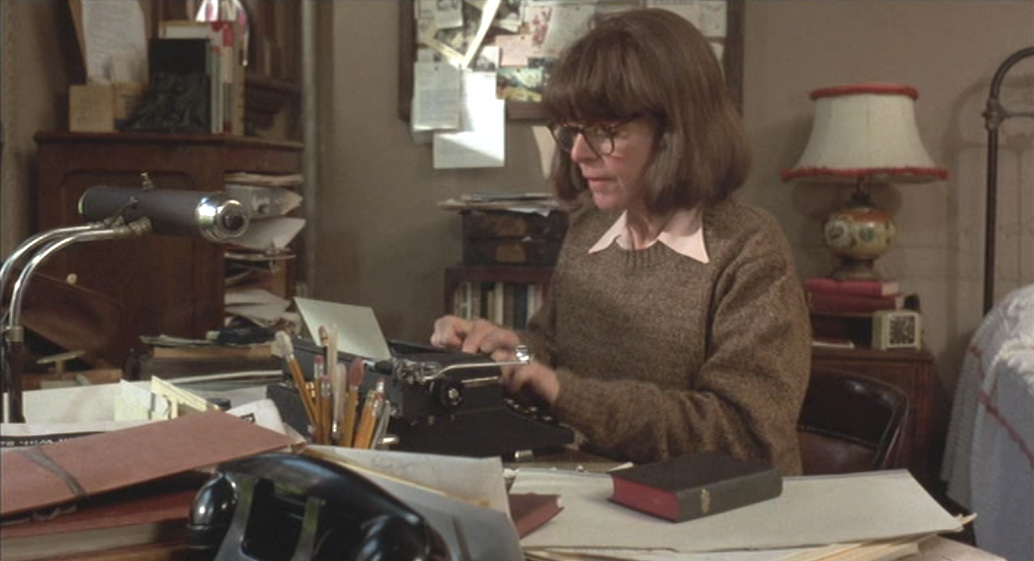Filming: Color
Length: 100 minutes
Genre: Biography/Comedy/Drama/Travel
Maturity: PG (for mild language)
Main Cast: Anne Bancroft (Helene Hanff), Anthony
Hopkins (Frank Doel), Judi
Dench (Nora Doel), Eleanor David (Cecily Farr), Maurice Denham (George Martin), Ian McNeice (Bill Humphries), Mercedes
Ruehl (Kay), Daniel Gerroll (Brian)
Director: David Hugh Jones
Personal
Rating: 5 Stars
***
Anne Bancroft
delivers a scintillating performance as the witty, wise-cracking Helene Hanff, a
self-professed “reader-writer” struggling to make ends meet in New York City,
1949. Her unusual taste in classic British literature puts her into contact
with a small London bookshop on 84 Charing Cross Road and opens up a new
chapter in her life as she begins a spicy written correspondence with
mild-mannered English bookseller, Frank Doel, played to a tee by Anthony
Hopkins.
At first, Helene’s
coarseness and feisty disposition seem doomed to clash with Frank’s British
reserve, but in the end, they find a residing commonality in the world of
books. From Chaucer to Donne, to Blake, to Newman and beyond, Helene orders
musty old volumes galore from “her bookshop”, spurring Frank on with alternate
compliments and insults to locate the rarest editions for her!
With the help of
her tenement neighbor’s British boyfriend, she also gets involved in sending
packages of food to 84 Charing Cross Road to help the residents bear up under
the severe post-war rationing. This gesture sparks the interest of Frank’s
secretary, Cecily, and also that of his Irish wife, Nora. Soon, the “American
lady” becomes something of a well-known enigma to both his co-workers and his
family, who reciprocate her generosity by sending her letters of their own as
well as a swath of finely-sewn English linen.
As the years pass,
Helene falls more and more deeply in love with the England of literature and
longs for the day when she will be able to visit London and “Frankie.” She
makes a gallant effort to cross the Atlantic for the coronation of Queen
Elizabeth II, but instead of getting to see her crowned, she if forced to spend
her travel money getting crowns put on her teeth! Nevertheless, when her
neighbor goes to London for her honeymoon, Helene entrusts her with a package
to sneakily drop off at the bookstore for her, leaving Frank and Company quite
mystified as to how in the world it got there.
As the ‘50’s give
way to the riotous ‘60’s, Helene and Frank continue to correspond by letter,
sharing their hopes, joys, sorrows, and contrasting senses of humor. But it is
only when Frank dies unexpectedly that Helene begins to fully realize just how
deep their love had been. It also prompts her to go on a “pilgrimage” to
complete some “unfinished business” in England.
Based on a true
story, 84 Charing Cross Road is, in
essence, shot through with spirituality. Helene and Frank find that, in spite
of their differences, they become “kindred spirits” because of their shared
interest in literary masterpieces. These works include some overtly religious
pieces, such as Donne’s Sermons, Newman’s Essays, and even original
copies of Handel’s Messiah.
In one scene,
Helene mentions that she is Jewish with various Catholic and Protestant
relatives. While she seem quite grounded in her general comportment throughout
the film, her choice in reading materials shows that there is more about her
than meets the eye. Beneath the tough Brooklyn exterior, there is a spiritually
alert, emotionally sensitive woman searching for love and truth.
And the word
“love” in this movie is not used in a two-dimensional or stereotypical sense.
Frank is a married man with children, and although he and Nora may not share
the fuzziest of relationships, as we observe from their dinner table silence,
theirs is a marriage made to love become they are truly devoted to one another,
even if they do not always broadcast their feelings.
Helene, on the
other hand, is a single, struggling artist, with evidently a lot of love to
give but nowhere definite to put it. She obviously grows fond of “Frankie”, and
he, for his part, is attracted to her personality and saddened by her inability
to come to England. His wife later confesses that she was initially rather
jealous of his keen enjoyment of the international correspondence. But that’s
as far as thing’s go. There is no romantic liaison between Helene and Frank, no
inappropriate sentiments expressed in the letters, no crossing of the moral
divide. It is strictly platonic, and yet there is no question after the final,
tear-jerking scenes of the film that love, in its purest sense, was present in
their relationship.
I personally found
this picture to one of the most deeply touching ones I have watched in a long
time. I must have reached for the Kleenex box three or four times in the
process of viewing it! The reason for this is that I could identify with
friendships built through written correspondence, the love of England and her
literature, the yearning to meet friends who live far away, and the price of
pain that hand-in-hand with loving and losing. I felt my self easily drawn into
the lives of both main characters and appreciated the resonance of realness and
warmth the film portrayed.
Some might feel
that the pace is somewhat slow and lulling in a stiflingly European style, but
I think it is appropriate for a movie focusing on gradual relational
development and the elapse of time. This is not a big-budget epic, nor was it
intended to be. Instead it is an intimate depiction of two human beings and
their intersection on the path of life. The definitive scene for me is when
Helene reads a passage from Donne’s Sermons about how when a person dies, a
chapter is not torn out of the book. Rather, it is translated into a better language.
And in the end, God will gather together all chapters and make the book open to
all.



No comments:
Post a Comment